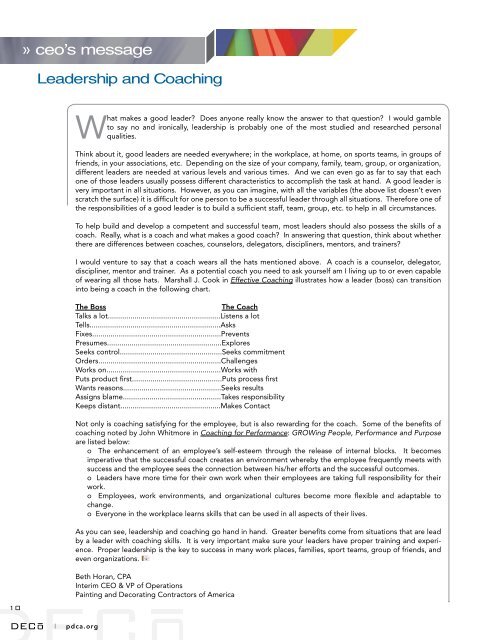n o v/d e c • 2 0 0 8 - Subscribe
n o v/d e c • 2 0 0 8 - Subscribe
n o v/d e c • 2 0 0 8 - Subscribe
Create successful ePaper yourself
Turn your PDF publications into a flip-book with our unique Google optimized e-Paper software.
10<br />
» ceo’s message<br />
Leadership and Coaching<br />
What makes a good leader? Does anyone really know the answer to that question? I would gamble<br />
to say no and ironically, leadership is probably one of the most studied and researched personal<br />
qualities.<br />
Think about it, good leaders are needed everywhere; in the workplace, at home, on sports teams, in groups of<br />
friends, in your associations, etc. Depending on the size of your company, family, team, group, or organization,<br />
different leaders are needed at various levels and various times. And we can even go as far to say that each<br />
one of those leaders usually possess different characteristics to accomplish the task at hand. A good leader is<br />
very important in all situations. However, as you can imagine, with all the variables (the above list doesn’t even<br />
scratch the surface) it is difficult for one person to be a successful leader through all situations. Therefore one of<br />
the responsibilities of a good leader is to build a sufficient staff, team, group, etc. to help in all circumstances.<br />
To help build and develop a competent and successful team, most leaders should also possess the skills of a<br />
coach. Really, what is a coach and what makes a good coach? In answering that question, think about whether<br />
there are differences between coaches, counselors, delegators, discipliners, mentors, and trainers?<br />
I would venture to say that a coach wears all the hats mentioned above. A coach is a counselor, delegator,<br />
discipliner, mentor and trainer. As a potential coach you need to ask yourself am I living up to or even capable<br />
of wearing all those hats. Marshall J. Cook in Effective Coaching illustrates how a leader (boss) can transition<br />
into being a coach in the following chart.<br />
The Boss The Coach<br />
Talks a lot.......................................................Listens a lot<br />
Tells................................................................Asks<br />
Fixes...............................................................Prevents<br />
Presumes........................................................Explores<br />
Seeks control..................................................Seeks commitment<br />
Orders............................................................Challenges<br />
Works on........................................................Works with<br />
Puts product first............................................Puts process first<br />
Wants reasons................................................Seeks results<br />
Assigns blame................................................Takes responsibility<br />
Keeps distant.................................................Makes Contact<br />
Not only is coaching satisfying for the employee, but is also rewarding for the coach. Some of the benefits of<br />
coaching noted by John Whitmore in Coaching for Performance: GROWing People, Performance and Purpose<br />
are listed below:<br />
o The enhancement of an employee’s self-esteem through the release of internal blocks. It becomes<br />
imperative that the successful coach creates an environment whereby the employee frequently meets with<br />
success and the employee sees the connection between his/her efforts and the successful outcomes.<br />
o Leaders have more time for their own work when their employees are taking full responsibility for their<br />
work.<br />
o Employees, work environments, and organizational cultures become more flexible and adaptable to<br />
change.<br />
o Everyone in the workplace learns skills that can be used in all aspects of their lives.<br />
As you can see, leadership and coaching go hand in hand. Greater benefits come from situations that are lead<br />
by a leader with coaching skills. It is very important make sure your leaders have proper training and experience.<br />
Proper leadership is the key to success in many work places, families, sport teams, group of friends, and<br />
even organizations.<br />
Beth Horan, CPA<br />
Interim CEO & VP of Operations<br />
Painting and Decorating Contractors of America<br />
| pdca.org








